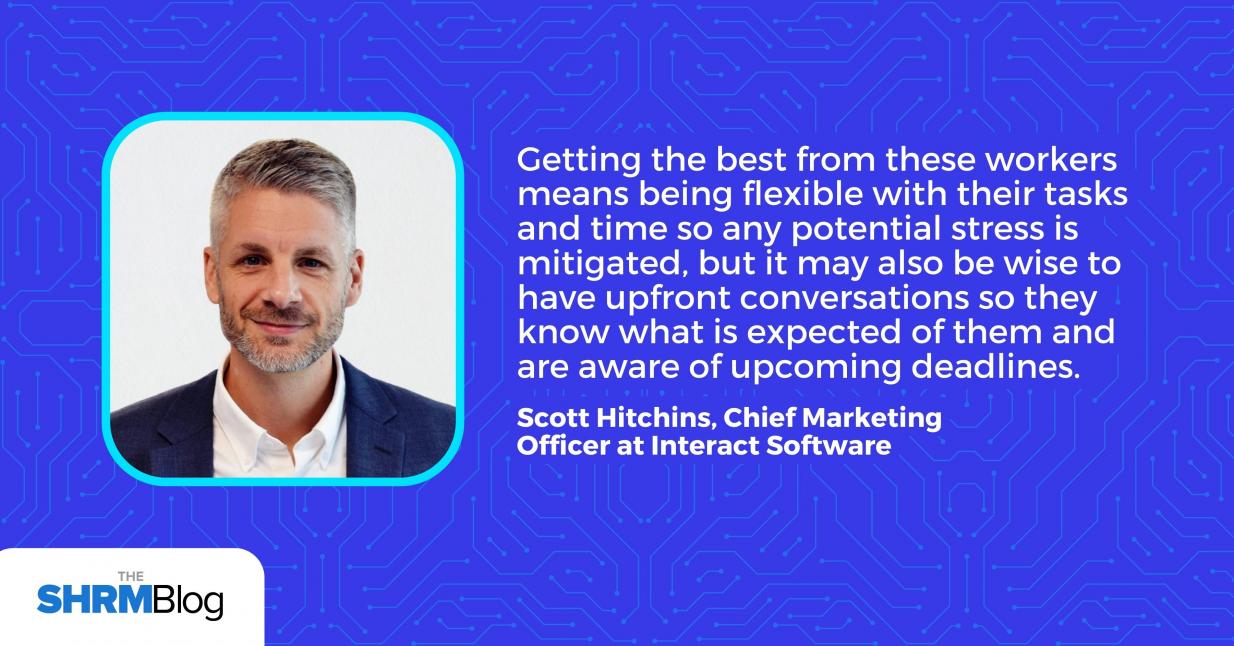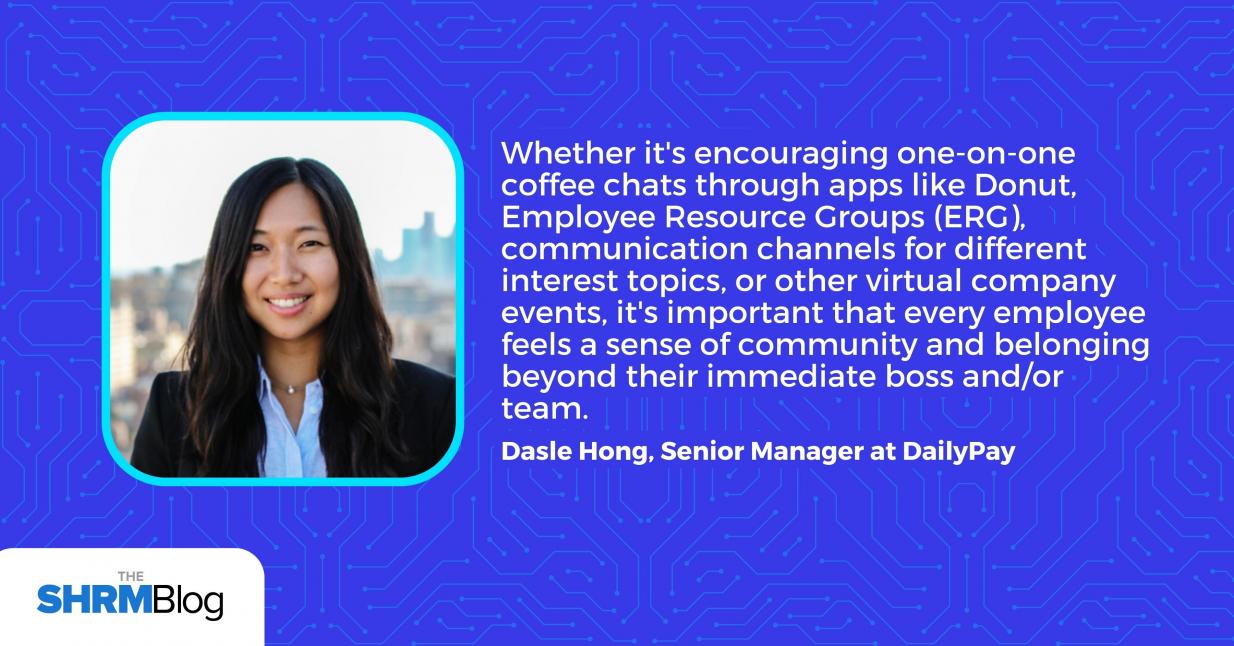13 HR Leaders Give Insight into Allowing Digital Nomad Employees

As an HR/business leader, provide one piece of insight into allowing digital nomad employees?
To help you best determine the place of digital nomad employees in your organization, we asked HR managers and business leaders this question for their best insights. There are several insights presented to help you embrace and best manage your remote workforce, especially the digital nomad employees.
Here are the insights that these 13 HR leaders provided about allowing digital nomad employees:
- It’s Easier to Know Who is Contributing or Not
- Understand Remote Workers’ Need for Workspace Flexibility
- Integrate Management Systems to Mitigate Risks
- Plan in Advance to Accommodate Continual Change
- Carve Out Failsafe Mechanisms
- Specific Roles Suit Digital Nomads Better Than Others
- Having Less Direct Control Increases Productivity
- Use Effective Communication Tools for Nomadic Work
- Enforce Deadlines
- Foster Digital Communities for Your Hybrid Workplace
- Create a Digital Nomad Policy
- Set and Define Healthy Expectations at the Onset
- Digital Nomads Are Like Homebased Remote Employees
It’s Easier to Know Who is Contributing or Not
As a leader that oversees a remote team, one thing I have noticed is that it is easier to see who is contributing and who is not. Our team is close and connected. It is common to see our Teams thread being very active throughout the day. Our employees are also available to connect at a moment's notice to discuss or dig into a project. These behaviors would be harder to identify in an office. Just because an employee is sitting at a desk, looking at a computer doesn't mean they are being productive. You know you have a strong "digital nomad" employee when they are available when needed. When they can hop on a call, camera on. When they are consistently hitting their KPIs. That being said, focus on the output and not how they are spending their minutes.
Steven Brown, Recruiting Manager, Pivot Workforce
Understand Remote Workers’ Need for Workspace Flexibility
Digital nomads are most productive when out in the crowd or surrounded by nature. This is one thing HR leaders need to consider when hiring them. These people want more workspace flexibility and freedom, as they are location independent and can work efficiently even outside the confines of the corporate office. Digital nomad employees are also reliable and can handle tasks without intense supervision. As long as the business provides them with the support they need, there is no doubt they can bring positive results to the company and help achieve its goals.
Jake Smith, Owner and Managing Director, Absolute Reg
Integrate Management Systems to Mitigate Any Risks
As they travel, digital nomads subject themselves to different employment laws, and if their employer is unaware of their location, they may unintentionally be violating these laws. By investing in integrated human management systems and maintaining consistent communication with digital nomads, HR teams can offset risks and resolve complications.
Through integrated systems, companies can collect and secure all essential employee data despite their location. HR departments can also draft a policy that requires digital nomads to notify the company about their current and intended residences so that employers can provide appropriate compensation and meet tax requirements. Investing in digital nomads may come with additional HR considerations, but it’s also an opportunity to access global talent and boost employee retention.
Justin Soleimani, Co-Founder, Tumble
Plan in Advance to Accommodate Continual Change
One of the biggest risks for digital nomads (and their employers) comes from unpredictability caused by frequent changes in physical working conditions. Nomadic employees will no doubt check things like WiFi connections or workstations before moving to a new place, but advance checking may not be sufficient to ensure everything goes smoothly. They may reach a new town or country and find things don't go as smoothly as expected, meaning they have to spend time finding an alternative place to work.
Getting the best from these workers means being flexible with their tasks and time so any potential stress is mitigated, but it may also be wise to have upfront conversations so they know what is expected of them and are aware of upcoming deadlines. Whether you're a digital nomad or a manager of one (or several) planning and resilience is key.
Scott Hitchins, CMO, Interact Software

Carve Out Failsafe Mechanisms
If digital nomads are a part of your organization, be aware of potential risk factors. These workers are location-independent; they work from wherever they choose, and rely on the use of technology to do so. But in the event that this technology is lost or stolen, it could lead to major safety and security concerns. Should company tech fall into the wrong hands, it is of utmost importance that measures are taken to mitigate the damage. Failsafe mechanisms, like kill switches, are designed to restrict unauthorized access, giving operations teams more time to act on the situation.
Kill switches are mechanisms designed to shut down or disable a device in case of theft or emergency. They can be operated remotely, meaning that teams can act quickly if nomads lose possession of their tech. If the device is recoverable, the device can be temporarily locked and encrypted instead. This ensures that digital nomads can enrich an organization without fear of tech falling into the wrong hands.
Max Wesman, Chief Operating Officer, GoodHire
Specific Roles Suit Digital Nomads Better Than Others
Digital nomad employees are not the right fit for every role but are strategic for content, writing, and project-based roles. Digital nomads must meet deadlines and quotas just like other employees – their lifestyle doesn’t exclude them from meeting the same performance expectations as everyone else. The best way to manage these employees is for employees to keep managers abreast of time zone differences and expectations. Digital nomads must compensate in terms of communication and relaying expectations to their managers to be successful in their roles.
The tricky part for these employees is maintaining a work-life balance when messaging and communicating across several hours of time difference. Nomads need to be able to respond and answer communications quickly to stay on the same page with businesses.
Kevin Miller, Founder
Having Less Direct Control Increases Productivity
In our business, we have found that allowing digital nomads into our company has dramatically boosted productivity. It sounds contradictory. Less direct control over your employees improves work ethic and standards, but it's proven to work. This sense of less direct control and allowing digital nomads into our space allows our nomad employees to work from wherever they like, whether that be on a beach in Spain or a coffee shop in New York, letting them decide where and even when they'd like to work boost productivity and in turn improves company profits.
Wendy Makinson, HR Manager, Joloda Hydraroll
Use Effective Communication Tools for Nomadic Work
Fostering healthy communication in the workplace–remote or in-office–means being clear, consistent, and efficient with your organization’s chosen communication tools. We use Zoom for meetings, Slack for instant messaging, and Asana for project management, all of which work seamlessly for us. We find that with the right tools, employees not only communicate more, but they actually enjoy interacting with each other throughout the workday
Asker Ahmed, Director & Founder, iProcess
Enforce Deadlines
It's important to emphasize that digital nomad employees are still tied to deadlines and the completion of tasks the same way they would be if they were in the office. Being in a different country and time zone does not give them a license to ignore deadlines. The best way to handle this is to clearly set out the guidelines and expectations for the employee before they are hired, so they understand that there are consequences for missing deadlines. Since the employer has no control over internet access, the employee must always ensure they have wifi access and don't go off the grid when needed.
Communication is still the most important part of teamwork, so digital employees must still adhere to some of the same guidelines they did in the office. Answering emails in a timely fashion and hitting benchmarks are still important no matter where you work from.
Georgi Todorov, Founder, ThriveMyWay
Foster Digital Communities for Your Hybrid Workplace
Whether it's encouraging one-on-one coffee chats through apps like Donut, Employee Resource Groups (ERG), communication channels for different interest topics, or other virtual company events, it's important that every employee feels a sense of community and belonging beyond their immediate boss and/or team. Depending on the type of culture you have, determine what the most organic and sustainable options are for building several communities at your organization.
Dasle Hong, Senior Manager, Employer Brand and Recruitment Marketing, DailyPay

Create a Digital Nomad Policy
Come up with a digital nomad policy. We live in a remote-work world now, no it only behooves businesses to develop policies that address the issues remote work brings, such as what time zone will we commit to? How will we include digital nomads/remote workers in our work culture? What software will we use to most effectively communicate with nomad workers? These are only a few of the issues that should be addressed in a digital nomad policy, which will make work life easier for the employer and the employed.
Alex Carroll, Founder, Caliber Games
Set and Define Healthy Expectations at the Onset
We're in an amazing time in the history of work. Technology has made it possible for people with desk jobs to work from anywhere. And they often do. But when your team has a 4pm ET meeting with the client and a key team member is spending a month in Jakarta (local time, 3am), it can turn into a real challenge.
The best way to make sure that digital nomad employees are engaged, successful and available is to set very clear expectations at the outset. When and for what meetings is the employee expected to be available? Within what windows is it ok for the employee to spend hours offline traveling? Can they take paid vacation for those hours up in the air, or would you prefer that it be done over the weekends? When are they expected to make a physical appearance in the office, and who will be the party responsible for paying for that (possibly big, expensive) flight?
A healthy, thorough conversation about expectations leaves everyone feeling more confident.
Nina Habib, Founder and Principal, Colleague LLC
Digital Nomads Are Like Homebased Remote Employees
If you have or are considering remote employees, now is a perfect time to diversify your talent pool with digital nomads. There are only a few differences between a stationary remote employee and a traveling digital nomad. Since digital nomads aren’t stationary, setting clear expectations for internet and phone connectivity during work hours is essential so they can make some adjustments to their plans to stay connected during work hours. Just like other remote employees, they also need a clearly defined schedule. However, for a digital nomad, knowing their schedule is critical as it allows them to plan their travel days in advance.
Lastly, know what that employee considers their legal home base (domicile). Just like stationary remote workers, you must consider if your organization is able to have an employee that is domiciled in another state or does your organization have limitations that might exclude a particular digital nomad (or any remote employee) from working for you.
Ann Jones, MBA, TSC, CSP, Director of Business Development, ACS Professional Staffing
Was this resource helpful?



